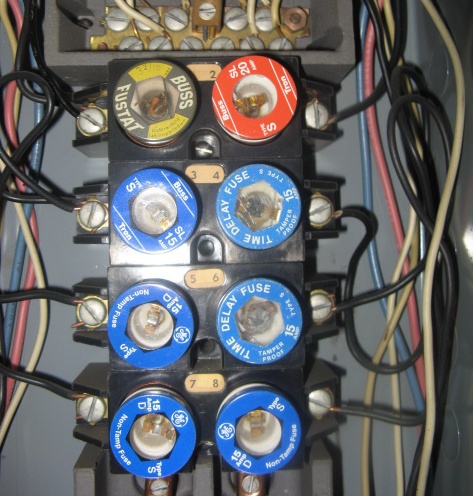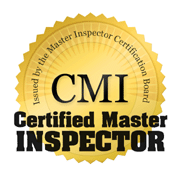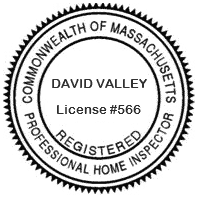Massachusetts Home Inspections YOUR INVESTMENT IS MY CONCERN

Fuses
Fuses are safety devices used in older electrical systems to protect circuits from overcurrent, which can cause overheating and lead to fires. They are still commonly found in older homes with fuse boxes, typically installed in the 1900's before modern circuit breakers became standard in 1960. A glass-type fuse consists of a metal strip or wire enclosed within a protective casing. When electricity flows through the fuse, it can handle normal current levels but if the current exceeds the fuse's rating due to an overload or short circuit, the metal strip melts (referred to as "blowing" the fuse). This breaks the electrical connection, cutting off power to the circuit and preventing damage or fire.
There are cartridge fuses as well. These are commonly used in 240-volt circuits, for the main shut-off and large appliances (e.g., dryers, stoves). They are shaped like a cylinder and inserted into fuse holders. They can handle higher amperages, often from 30 to 60 amps or more.
While fuses are inherently safer than circuit breakers in some respects, they present a potential hazard when improperly handled. An uninformed occupant may replace a correctly sized fuse with one that has a higher amperage rating to prevent blowing a fuse, which can lead to circuit overload and increase the risk of a fire.

The fuse box contains a fuse for each electrical circuit. Fuses protect your circuits by stopping the flow of electricity if an overload or fault occurs. When an electrical short happens or the circuit becomes overloaded, the fuse burns out and breaks the circuit — a situation commonly known as a "blown fuse".
HOW TO CHANGE A FUSE
Before restoring electricity, the blown fuse must be replaced with a new one. However, before doing so, take necessary precautions to ensure safety. First, turn off or unplug all devices connected to the circuit. Confirm that there are no hazardous conditions present before re-establishing power.
Replace the blown fuse with one that matches the proper rating for the circuit. For example, if the circuit is rated for 15 amps, use a 15-amp fuse. Never use a fuse with a different rating. To further ensure safety, consider installing "Fuse Stats" or "Type S" inserts in all fuse sockets. These inserts only allow the correct size fuse to be installed, preventing the risk of overfusing the circuit.
When removing or inserting a new fuse, NEVER touch the metal parts of the fuse. If your fuse box has a master switch to cut power to the entire box, be sure to turn off the main power before replacing the fuse.
Electricity should now be restored to the circuit. If the fuse blows again before any devices are turned on or plugged in, this may indicate a serious wiring issue. In this case, contact a licensed electrician immediately. If the fuse blows after turning on or plugging in a device, the device may have a short or could be overloading the circuit.
If no fuses are blown and you still have no power at an outlet, check that the switch (if there is one) controlling the outlet is turned on. If no issues are found, the outlet, switch, wiring, or another component could be the problem. Additionally, the outlet may be part of a GFCI branch circuit. Refer to the section on GFCIs for instructions on how to check a GFCI outlet.
Here is what my clients have to say about my home inspection services:
Press F5 (on your keyboard) for additional testimonials
Hi David,
I just wanted to send you a quick note to thank you again for your help yesterday!!
Andy and I are very appreciative of all of the information you provided us with, and we both feel that we have an excellent understanding of what needs to be done to this home, and can make our decision with assurance. The tips that you provided us with are invaluable, and I will definitely recommend you to anyone I know that is or will be buying a home.
Thank you again!
Alyssa














